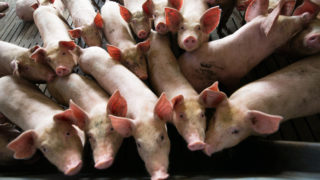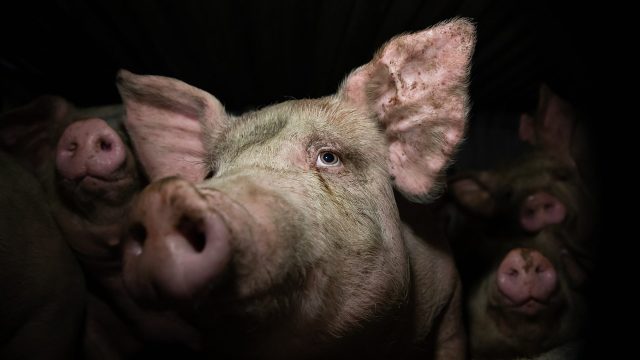
New White Paper Offers Policy Recommendations to Combat Zoonotic Diseases and Pandemic Risk from Factory Farming
The Animal Legal Defense Fund asserts industrial animal agriculture harms humans, animals and the environment — and serves as breeding ground for pathogens
Contact: media@aldf.org
SAN FRANCISCO, CA — The Animal Legal Defense Fund, the preeminent legal advocate for animals, released the second in a series of white papers providing policy recommendations to address industrial animal agriculture’s role in our heightened risk for zoonotic diseases outbreaks, like COVID-19, and its potential to be the source of the next global pandemic. The paper — COVID-19 and Factory Farming — asserts that as the government attempts to manage the staggering impact of COVID-19, it must also aggressively pursue policies that protect public health and animals by reducing the threats posed by factory farming conditions.
Live markets, where diverse live animals are sold and slaughtered on demand, originally received significant attention and criticism due to suspicion that COVID-19 originated in a live market in Wuhan, China — as SARS had originated in a similar market in 2002. The Animal Legal Defense Fund’s paper raises the alarm that factory farms engage in many of the same risky practices as live markets, but on a scale orders of magnitude greater, and yet the factory farming industry is promoted and subsidized with millions of taxpayer dollars – thereby increasing the risk of animal pandemic outbreak.
This white paper outlines critical policy recommendations to address the issues of factory farming and the threats of future pandemics, including:
- Prohibit new factory farm construction: Congress and state legislatures must prohibit building new, or expanding existing, factory farm facilities and establish a timeline to phase them out altogether to protect people, animals, and the environment from the abuse, devastation, and looming risks of our precarious food system.
- End subsidies for animal agriculture products: Government subsidies to the meat and dairy industry help prop up an industry that continuously puts public health at risk from pandemic disease as well as antibiotic-resistant bacteria. Such subsidies should end in order to level the competitive playing field for less harmful and more humane products.
- Support a more sustainable, more resilient food system: To move away from an unsafe and outdated food system, governments must prioritize offering support to farms and facilities that are already transitioning away from these harmful practices or are using methods that lower the risk of disease over those in the factory farming industry while offering people and communities support, safety nets, and social protection as the shift takes place.
- Ensure animal cruelty laws are effective: Factory farmed animals subjected to over-crowding, injury, neglect, and illness are more susceptible to disease and more apt to spread contagions, enhancing the need to address this suffering. Measures would include ensuring that anti-cruelty laws actually reach farmed animals — who are typically exempt from state anti-cruelty laws.
- End subtherapeutic use of antibiotics: As there are a variety of pathways for antibiotic resistance from factory farming to transmit to human communities — including through workers into their homes and communities — governments must prohibit the subtherapeutic use of antibiotics for both growth promotion and disease prevention in healthy animals.
- Stop deregulation of slaughter and line speed increases: As with the cruel pig-handling practices, evidence suggests that inhumane treatment of chickens increases with line speeds, which is in part why the Safe Line Speeds in COVID-19 Act was introduced — and must be supported — in both chambers of Congress. This bill would suspend current or new line speed waivers and prohibit the U.S. Department of Agriculture from using federal funding for increased line speeds for the duration of the COVID-19 pandemic to ensure workers are safe.
Beyond creating a system ripe for animal-to-human disease transmission and proliferation, we are seeing this disease exacerbating existing public health crises, including housing and food insecurity, violence, and inequities in our society, which harm both people and animals. To address the pandemic and systemic issues in our food system, we must develop these multi-disciplinary policies to mitigate and eliminate the human–animal interactions that lead to exposure from factory farming.
Focus Area
Issues
Related
-
ALDF Partners with Advocates to Challenge EPA for Discarding Slaughterhouse Water Pollution Rules
10 Organizations petition federal court over EPA’s abandonment of rules to reduce pollution from meat processing industrySeptember 19, 2025 News -
Pigs and Public Health Act Reintroduced in the U.S. House to Prohibit Slaughter of Downed Pigs
Bill will reduce the risk of zoonotic disease transmission and foodborne illness by establishing new standards for non-ambulatory, or “downed” pigsJuly 25, 2025 Press Release -
Lawsuit Filed to Force USDA to Provide FOIA Documents Related to the Beef Checkoff Program
The agency has a history of approving promotional content funded by the program with false and misleading claims about beef’s environmental impactsJuly 17, 2025 Press Release



